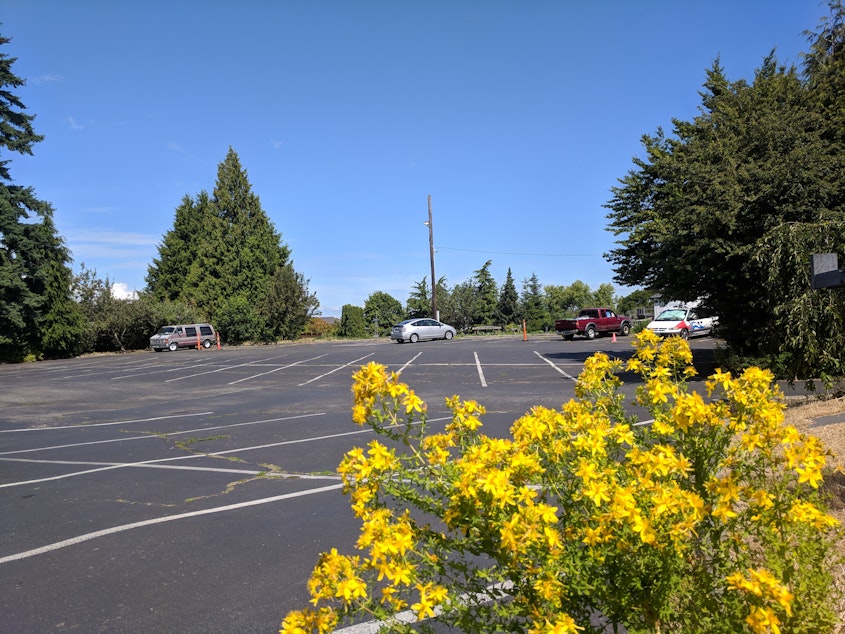Car-dwellers in Seattle may soon have parking spots to call their own

For about a year, TJ lived in a small, gray SUV with his wife Misty.
They’d worked and lived at an elder care facility, but when that changed hands, they ended up in their Dodge.
At night, they drove through central Seattle, Tacoma, south King County … trying to find somewhere to sleep.
They looked for spots where they’d feel secure, and where they wouldn’t be asked to move.
TJ, 53, slept sitting up in the front, on guard while Misty, 40, slept across the back seat. By the end of the night, TJ’s neck and back ached.
“For us, the main thing was safety, not comfort,” TJ said.
Sponsored
They had nowhere to brush their teeth or wash. Privacy was nonexistent; anyone could look into their vehicle.
On any given night, more than 2,000 people like TJ and Misty live in their vehicles, according to the annual tally of people who are homeless in King County.
Now the City of Seattle is launching an effort to provide safe parking spots for some of these people.
This pilot project will provide up to 30 safe parking spots with social services.
The first step the city is taking is to pay for the expansion of an existing safe parking program at a church just north of Ballard, a stone’s throw from Golden Gardens. From there, the city will ask other faith communities to offer up their own parking lots.
The spots would serve people living in cars, but not RVs, and those who want a spot will go through screening. At the church near Ballard, people must be sober and those with violent or sexual offenses are not allowed to stay.
The city has set aside $250,000 in the 2019 budget for this undertaking.
Sponsored
O
ur Redeemer’s Lutheran Church has offered space to people living in their vehicles since 2012. City funding has come and gone over the years, but the safe lot has remained.
At one end of the lot, a row of spaces is blocked off with orange traffic cones. This is where vehicle residents park.
The church could take seven cars at a time, but they usually have far fewer, because they haven't had stable funding for the social services that come with hosting car-dwellers.
The new funding from the city would allow them to fill these seven spots.
Sponsored
This is where TJ and Misty finally ended up. They spent about six weeks in the church’s lot.
TJ described it as a godsend. "On a scale from 1 to 10, I would certainly give it 100," he said.
The goal at Our Redeemer’s is to get people out of their cars and into something better – TJ and Misty are now in temporary housing.
The church provides access to a bathroom, shower, laundry facilities and a place indoors when the weather gets bad.
But they also partner with a service organization, the Urban League of Metropolitan Seattle, to ensure people get help with things like housing and employment.
Sponsored
Shannon Beck is the social justice coordinator for the church. She said that partnership is crucial.
“We are not social workers,” she said. “Many of us think we are, and a big heart is what opens the space, but it isn’t necessarily the thing that moves people forward."
Urban League has partnered with the city to provide case management at all parking spots set up under the new pilot. They’re in charge of referrals, screening, and helping people move forward.
Linda Taylor, a vice president at Urban League, said the best candidates are those who have a steady income from work or disability payments and who are committed to getting into housing fast.
T
he city has tried safe parking programs before, but past attempts have been costly and ineffective. A safe lot opened for RVs in 2016 cost the city $35,000 per month to run and housed 25 vehicles. Eleven of those RVS residents moved into permanent housing before it was closed.
And in other neighborhoods, the idea of a safe parking lot has stirred up tension.
After a permit was filed to put a safe lot for 30 vehicles at Genesee Park in south Seattle, the city received strong push-back from community members. The permit was then withdrawn and the city insisted they had made no decisions but were considering multiple options.
Some neighbors there have criticized the city for not including them and others raised concerns about crime, safety and drug use.
Lily Rehrmann of the city’s Human Services Department said they’re starting small with this effort to learn how to best serve people living in cars.
"Often people who are living in their cars are pretty new to homelessness, their car is their last asset, it’s what keeps them connected to going to a job every day or going to school," she said. "We are testing whether we can better serve that community of people.”
The city will collect data to evaluate the program through the rest of the year. More funding could be added to the next budget if it's successful.
Beck said she is confident the community surrounding their church won't object to them adding a few more cars. After all, the program has been running for seven years.
"Nothing is really changing, it's just that we're hopefully going to have a few more folks," she said.
As the city appeals to other faith communities, they may have to work harder to persuade residents in other neighborhoods.




